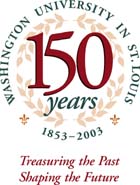It’s here! It’s finally here. A celebration 150 years in the making is about to commence, as the University officially kicks off its sesquicentennial year.
“Our sesquicentennial theme is ‘Treasuring the Past. Shaping the Future,'” Chancellor Mark S. Wrighton said in a statement. “Indeed, a great university becomes so because of great people, and our current well-being and future strength have been developed by many who preceded us and shaped our University as we know it today.

“The work we now do will contribute to shaping the University to serve future generations. It is a privilege to have had the opportunity to serve as chancellor in an era of such remarkable progress for Washington University, and to be a part of the family of more than 120,000 students, faculty, alumni and staff who are continuing to make the world a better place.”
As part of the celebratory year, the University is launching an initiative to help better understand the role that research universities can play in addressing issues related to the environment.
Funded by a grant from the V. Kann Rasmussen Foundation, this project represents the beginning of an environmental initiative at the University that will shape the educational programs, research and operations of the University related to the environment, and will become one of the defining interdisciplinary programs of the University.
More significantly, the project is intended to define the best programs and practices for universities in addressing environmental issues and will identify the most important opportunities and challenges for higher education.
The heart of the project is a series of colloquiums to be conducted during the 2003-04 year, covering the following topics: major 21st-century issues to be addressed; definition and implementation of best practices in university operations; identification of best educational programs related to environment for undergraduate, graduate and professional students; environment and human health; and two colloquia on challenges and achievements in science and engineering research related to the environment, including the current and potential role of modern plant science; and political, social and humanistic issues related to the environment.
In support of the project, the University is presenting two lectures in October.
At 3 p.m. Oct. 3, former Environmental Protection Agency directors Carol Browner, principal of the Albright Group, and Wil-liam Reilly, chief executive officer of Aqua International Partners, will present a Sesquicentennial Environmental Initiative Lecture.
And at 3 p.m. Oct. 9, noted environmental scientists Mario Molina, Nobel laureate and professor of chemistry and of earth, atmospheric and planetary sciences at Massachusetts Institute of Technology, and Jane Lubchenco, professor of marine biology at Oregon State University, will present another Sesquicentennial Environmental Initiative Lecture. Both are past winners of the Heinz Environmental Prize.
Both lectures are free and open to the public and will be held in Graham Chapel.
“At 150, Washington University is a remarkable place,” said Robert L. Virgil, Ph.D., chair of the Sesquicentennial Commission.
“The campuses are being transformed with new and improved spaces that support teaching and learning and medical care. The students are impressive. Faculty members are engaged in important research, ranging from the highly visible Human Genome Project to answering the question: ‘Why do some nations become rich while others remain poor?’ — among many, many others.
“Washington University graduates are contributing in thousands of important ways to their communities, the nation and the world.
“Looking back at the achievements of the men and women who have built Washington University into the place it is today is inspirational. Looking ahead and imagining what the University might still become is exciting.”
For more information on sesquicentennial activities, go to 150.wustl.edu and look for stories in upcoming issues of the Record.